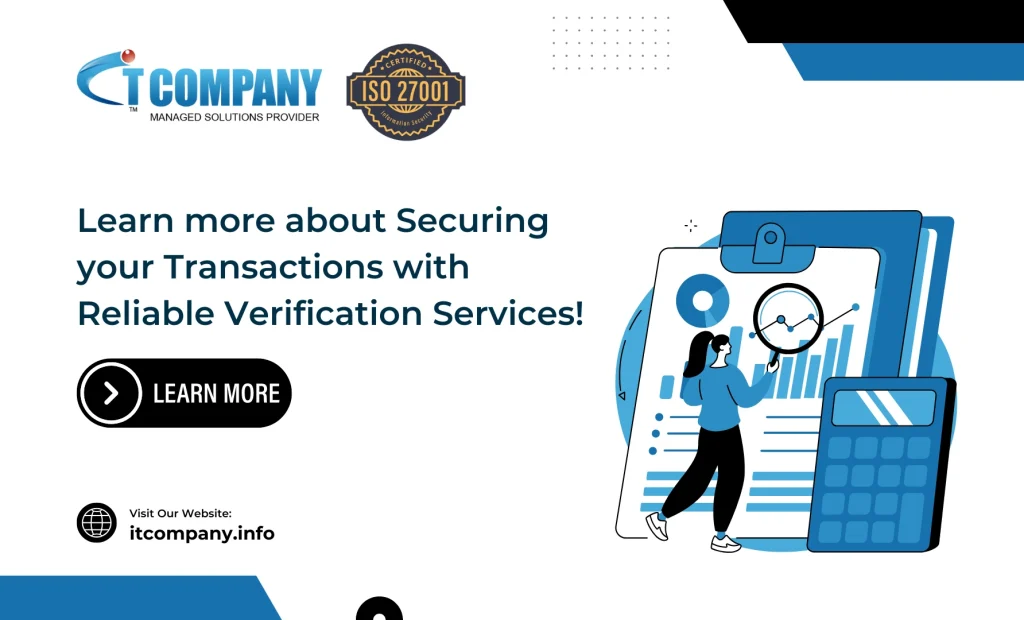
Third party verification services are the paramount of website security. Digital landscape of today’s world is very complex. And robust third-party verification services is an essential tool for ensuring the authenticity of active users, transaction records and other data handling.
IT Company – ISO 27001 ensures and commits to your digital asset protection against potential hacking of website and other vulnerability issues.
Table of Contents
ToggleWhat are Third Party Verification Services?
Third-party verification services are external organizations or platforms that validate the identity of users or the integrity of data without being directly involved in the transaction. These services utilize various technologies and methodologies to authenticate users, ensuring that they are who they claim to be. Common applications include identity verification, credit checks, background checks, and transaction verification.
| Identity Verification | Confirms a user’s identity through documents or biometric data | Onboarding users, preventing fraud |
| Credit Verification | Assesses the creditworthiness of individuals or businesses | Loan approvals, credit applications |
| Background Checks | Investigates criminal history, employment records, etc. | Hiring processes, tenant screenings |
| Transaction Verification | Ensures the legitimacy of transactions between parties | E-commerce, financial services |
Importance of Third Party Verification
1. Enhancing Security
One of the primary functions of third-party verification services is to bolster security. By verifying user identities, platforms can prevent unauthorized access, reducing the risk of fraud and data breaches.
2. Building Trust
Consumers are more likely to engage with platforms that prioritize security. These services provide an added layer of trust, assuring users that their data and transactions are secure.
3. Compliance with Regulations
Many industries are subject to strict regulations regarding data protection and user verification. Third-party services help businesses comply with these regulations, avoiding legal penalties and maintaining their reputation.
4. Streamlining Processes
Automated verification processes reduce the need for manual checks, making onboarding quicker and more efficient. This can enhance the user experience and lead to higher conversion rates.
Benefits
1. Reduced Risk of Fraud
By employing sophisticated verification methods, third-party services can significantly reduce the risk of fraudulent activities, protecting both businesses and consumers.
2. Cost-Effective Solutions
While implementing verification processes in-house can be costly, and often provide more affordable solutions, leveraging economies of scale and advanced technology.
3. Access to Advanced Technology
These services invest in cutting-edge technology, such as AI and machine learning, to enhance their verification processes. Businesses can leverage these innovations without the associated costs of development.
4. Scalability
As businesses grow, their verification needs may evolve. Third-party services can easily scale to meet increased demand, allowing businesses to focus on their core operations.
Choosing the Right Third Party Verification Service
When selecting a third-party verification service, businesses should consider several factors:
1. Reputation and Reliability
Research the provider’s reputation in the industry. Look for reviews and testimonials from other businesses to gauge their reliability.
2. Compliance and Security Standards
Ensure that the service complies with relevant regulations and adheres to industry best practices for data security.
3. Customization and Flexibility
Choose a provider that offers customizable solutions to meet your specific needs and can adapt to changes in your business.
4. Integration Capabilities
Verify that the service can seamlessly integrate with your existing systems and workflows, minimizing disruption during implementation.
5. Customer Support
Assess the level of customer support offered. A responsive support team can be invaluable in resolving any issues that may arise.
Conclusion
Third-party verification services are indispensable for online platforms striving to maintain security, build trust, and comply with regulations. By leveraging these services, businesses can not only enhance their security posture but also improve user experience and operational efficiency. As the digital landscape continues to evolve, investing in reliable third-party verification solutions will be a key strategy for success.
Final Thoughts

As the digital economy grows, so does the sophistication of threats. Organizations must prioritize security and verification to protect themselves and their customers. By adopting these services, businesses can safeguard their operations and foster a secure online environment.




